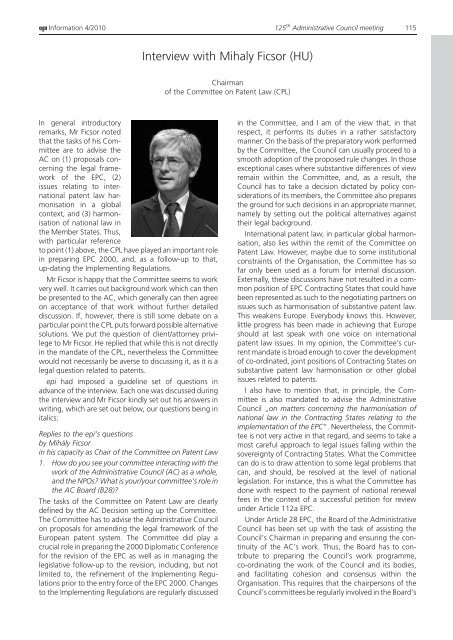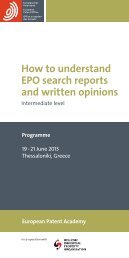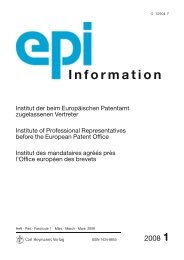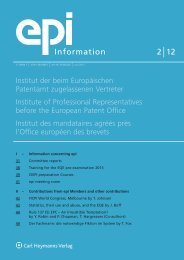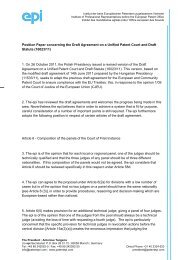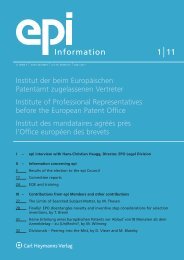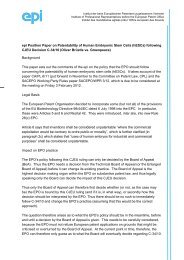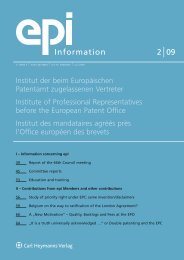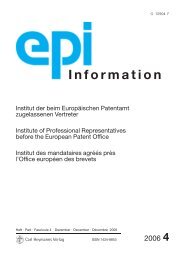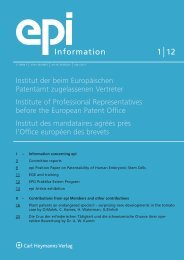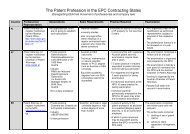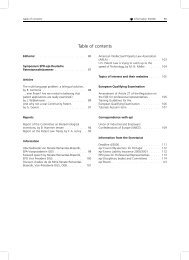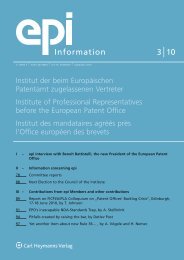epi Information 4/2010
epi Information 4/2010
epi Information 4/2010
- No tags were found...
You also want an ePaper? Increase the reach of your titles
YUMPU automatically turns print PDFs into web optimized ePapers that Google loves.
<strong>Information</strong> 4/<strong>2010</strong> 125 th Administrative Council meeting 115Interview with Mihaly Ficsor (HU)Chairmanof the Committee on Patent Law (CPL)In general introductoryremarks, Mr Ficsor notedthat the tasks of his Committeeare to advise theAC on (1) proposals concerningthe legal frameworkof the EPC, (2)issues relating to internationalpatent law harmonisationin a globalcontext, and (3) harmonisationof national law inthe Member States. Thus,with particular referenceto point (1) above, the CPL have played an important rolein preparing EPC 2000, and, as a follow-up to that,up-dating the Implementing Regulations.Mr Ficsor is happy that the Committee seems to workvery well. It carries out background work which can thenbe presented to the AC, which generally can then agreeon acceptance of that work without further detaileddiscussion. If, however, there is still some debate on aparticular point the CPL puts forward possible alternativesolutions. We put the question of client/attorney privilegeto Mr Ficsor. He replied that while this is not directlyin the mandate of the CPL, nevertheless the Committeewould not necessarily be averse to discussing it, as it is alegal question related to patents.<strong>epi</strong> had imposed a guideline set of questions inadvance of the interview. Each one was discussed duringthe interview and Mr Ficsor kindly set out his answers inwriting, which are set out below, our questions being initalics:Replies to the <strong>epi</strong>’s questionsby Mihály Ficsorin his capacity as Chair of the Committee on Patent Law1. How do you see your committee interacting with thework of the Administrative Council (AC) as a whole,and the NPOs? What is your/your committee’s role inthe AC Board (B28)?The tasks of the Committee on Patent Law are clearlydefined by the AC Decision setting up the Committee.The Committee has to advise the Administrative Councilon proposals for amending the legal framework of theEuropean patent system. The Committee did play acrucial role in preparing the 2000 Diplomatic Conferencefor the revision of the EPC as well as in managing thelegislative follow-up to the revision, including, but notlimited to, the refinement of the Implementing Regulationsprior to the entry force of the EPC 2000. Changesto the Implementing Regulations are regularly discussedin the Committee, and I am of the view that, in thatrespect, it performs its duties in a rather satisfactorymanner. On the basis of the preparatory work performedby the Committee, the Council can usually proceed to asmooth adoption of the proposed rule changes. In thoseexceptional cases where substantive differences of viewremain within the Committee, and, as a result, theCouncil has to take a decision dictated by policy considerationsof its members, the Committee also preparesthe ground for such decisions in an appropriate manner,namely by setting out the political alternatives againsttheir legal background.International patent law, in particular global harmonisation,also lies within the remit of the Committee onPatent Law. However, maybe due to some institutionalconstraints of the Organisation, the Committee has sofar only been used as a forum for internal discussion.Externally, these discussions have not resulted in a commonposition of EPC Contracting States that could havebeen represented as such to the negotiating partners onissues such as harmonisation of substantive patent law.This weakens Europe. Everybody knows this. However,little progress has been made in achieving that Europeshould at last speak with one voice on internationalpatent law issues. In my opinion, the Committee’s currentmandate is broad enough to cover the developmentof co-ordinated, joint positions of Contracting States onsubstantive patent law harmonisation or other globalissues related to patents.I also have to mention that, in principle, the Committeeis also mandated to advise the AdministrativeCouncil „on matters concerning the harmonisation ofnational law in the Contracting States relating to theimplementation of the EPC“. Nevertheless, the Committeeis not very active in that regard, and seems to take amost careful approach to legal issues falling within thesovereignty of Contracting States. What the Committeecan do is to draw attention to some legal problems thatcan, and should, be resolved at the level of nationallegislation. For instance, this is what the Committee hasdone with respect to the payment of national renewalfees in the context of a successful petition for reviewunder Article 112a EPC.Under Article 28 EPC, the Board of the AdministrativeCouncil has been set up with the task of assisting theCouncil’s Chairman in preparing and ensuring the continuityof the AC’s work. Thus, the Board has to contributeto preparing the Council’s work programme,co-ordinating the work of the Council and its bodies,and facilitating cohesion and consensus within theOrganisation. This requires that the chairpersons of theCouncil’s committees be regularly involved in the Board’s


